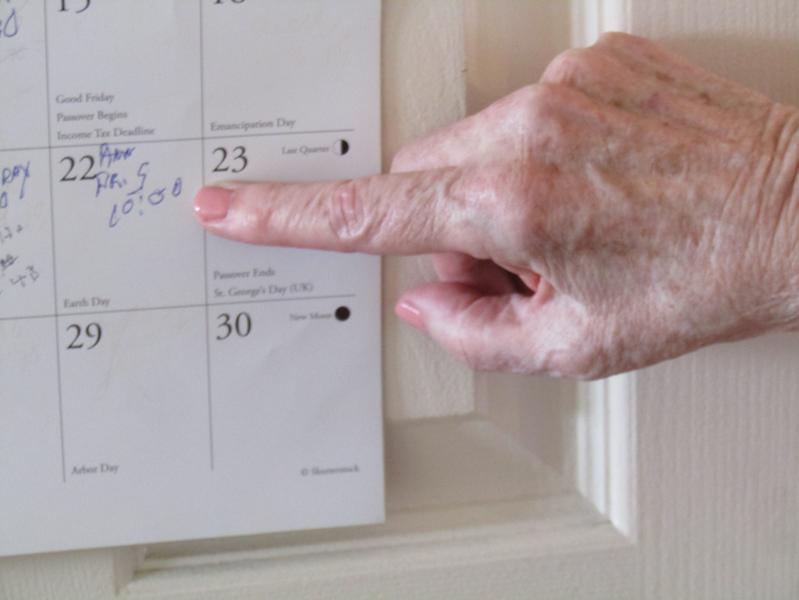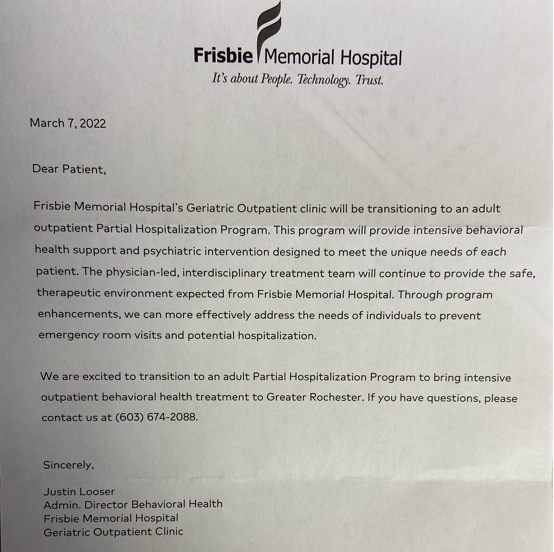
ROCHESTER - It may go down in history as the most confusing letter ever sent by a health care provider to its own patients, a letter that was supposed to alert them of the cessation of the Geriatric Outpatient clinic at Frisbie Memorial Hospital, but instead left this especially vulnerable population completely in the dark.
Ironically, one of those patients who suffered added anxiety and depression
was 75-year-old Ann Moynihan of Rochester, who worked as an RN at Frisbie for 20 years.
Moynihan, who suffers from anxiety, depression and early onset dementia, said she and her husband, Dan, had no clue what the letter meant when they received it last month. Once they found out Frisbie's Geriatric Outpatient program was closing on March 25, she said she was desperate, because she relies on psychiatric meds to keep her on an even keel.
She said she got the heads-up from her psychiatrist at Frisbie, Dr. Susan Smiga, who worked a couple of days a week at the center as a locum, a temporary medical doctor hired to work there part time through an employment agency.
Smiga told The Rochester Voice that she went out of her way to contact her patients, but said there was no organized effort to make sure all the patients knew exactly what was happening, something Frisbie executives denied in a phone interview on Friday.
Ann Moynihan, who has suffered with mental health issues for nine years, said Frisbie's sudden closure of its geriatric mental health program felt like the hospital had pulled out the rug from under her.
"It's been crazy," she said in the dining room of her comfortable home at Meadowbrook Village. "Me, I'm already anxious, this made it worse. You're never sure what we're doing. I had an appointment for April, but Susan called me and told me 'Don't go, the program is over.'"
 |
| Ann Moynihan points to her next appointment on April 22 that never came of fruition. |
She said she was fretful that she wouldn't be able to refill her prescription, but she remembered a former outpatient mental health counselor who'd treated her several years ago whom she'd learned was working at Great Bay Mental Health in Dover.
"I lucked out," she said. "I got ahold of her and she set me up with a nurse practitioner who would prescribe my meds."
Smiga, who lives in Hanover, began working as a locum in Frisbie's Geriatric Outpatient Clinic in 2020.
She said when she saw the letter that was supposed to alert elderly psychiatric patients to the clinic's imminent closing, she was appalled at its nebulous composition.
 |
| A copy of the letter purported to explain the center's imminent closure. |
"The process by which HCA handled closure of the clinic clearly did not put patients first, leaving many older vulnerable adults without care," Smiga said earlier this month. "My issue is the letter was not clear to patients who are being abandoned."
She said in the case of the Moynihans, Ann was lucky in that she had the support of a caring husband, but that many of these patients have more severe dementia and live alone or with family members that are not as well able to care for them or to process what the letter stated ... or didn't state.
"Most are not in acute mental health distress but I know of one who is suicidal and is cared for by her mother who is in her 90s," Smiga said.
She said she talked to administrators at the hospital, some of whom agreed the letter was inadequate, and the timeline for the clinic's closing was too short, but no one reached out to her.
Smiga said, unbelievably, no one at the clinic was tasked with returning patient calls regarding the impending March 25 closure.
For their part, Frisbie's CEO Tim Jones and Behavioral Health market director Justin Looser both agreed on Friday that the letter could have been more "robust."
"I think that's a fair criticism," Looser said. "It's a hard transition to make. It could have been more clear, but Rochester as a community is better off now."
Jones noted that the Geriatric Outpatient Clinic was only seeing about two patients a day, and since they have transitioned to an intensive in-hospital program they are seeing about 75 people a week.
"We had to look at the needs of the community," he said, "and the biggest need is emergency psychiatric care. The acuity is in the Emergency Department. The Emergency Department is in dire straits."
Looser also contended that prior to the transition they made sure all the individuals in the Geriatric Outpatient Clinic were each given "a list of resources and three months of medication," something Smiga said is simply not true.
Asked why they decided to ditch the Geriatric program, both agreed that the Rochester community's more broader need is for intensive inpatient treatment of individuals 18 and over.
Looser added that the realities of the situation is that behavioral health in general is never a financial windfall.
"But even though it's a loss leader where we are losing money, this is something Rochester needs," he said. "Doing this transition is not a financial decision; it's about how many people are waiting in the EDs. That's bad for patients."
Jones added that the hospital continues its commitment to mental health treatment with the opening at the end of the month of a $1.5 million Behavioral Health Emergency Pod, which will comprise six private psyche-safe rooms.
Meanwhile, Smiga is not going quietly. She told The Rochester Voice that last month she reported Frisbie's poor transition to the state DHHS's health facilities administration.
"I told my patients I thought they'd been mishandled and gave them the number," she said. "I haven't heard back from them."
The Rochester Voice reached out to the health facilities administration for comment but received no return call.
If anyone want to get in touch with them they can be reached at (603) 271-9499.
Below is a verbatim transcript of the letter.
Dear Patient,
Frisbie Memorial's Geriatric Outpatient clinic will be transitioning to an adult outpatient Partial Hospitalization Program. This program will provide intensive behavioral health support and psychiatric intervention designed to meet the unique needs of each patient. The physician-led interdisciplinary treatment team will continue to provide the safe, therapeutic environment expected from Frisbie Memorial Hospital. Through program enhancements, we can more effectively address the needs of individuals to prevent emergency room visits and potential hospitalizations.
We are excited to transition to an adult Partial Hospitalization Program to bring intensive outpatient behavioral health treatment to Greater Rochester. If you have questions, please contact us at (603) 674-2088.
Justin Looser
Admin. Director Behavioral Health
Frisbie Memorial Hospitalization
Geriatric Outpatient Clinic













